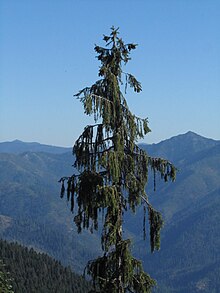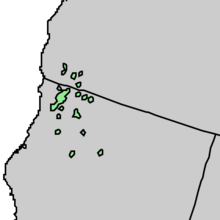Picea breweriana
| Picea breweriana | |
|---|---|
 |
|
| Brewer spruce, Ridge above Bear Lake, Siskiyou Mountains, Ca. | |
| Scientific classification | |
| Kingdom: | Plantae |
| Division: | Pinophyta |
| Class: | Pinopsida |
| Order: | Pinales |
| Family: | Pinaceae |
| Genus: | Picea |
| Species: | P. breweriana |
| Binomial name | |
|
Picea breweriana S.Watson |
|
 |
|
| Natural range of Picea breweriana | |
 |
|
| Close-up of natural range of Picea breweriana | |
Picea breweriana, known as Brewer spruce,Brewer's weeping spruce, or weeping spruce, is a species of spruce native to western North America, where it is one of the rarest on the continent, endemic to the Klamath Mountains of southwest Oregon and northwest California. The specific epithet breweriana is in honor of the American botanist William Henry Brewer.
DNA analyses have shown that Picea breweriana has a basal position in the Picea clade, suggesting that Picea originated in North America.
It grows at moderately high altitudes, from 1000–2700 m.
It is a large evergreen coniferous tree growing to 20–40 m tall, exceptionally 54 m, and with a trunk diameter of up to 1.5 m. The bark is thin and scaly, and purple-gray in color. The crown is very distinct, distinguished by level branches with vertically pendulous branchlets, each branch forming a 'curtain' of foliage. The pendulous foliage only develops when the tree grows to about 1.5–2 m tall; young trees smaller than this (up to about 10–20 years old) are open-crowned with sparse, level branchlets. The shoots are orange-brown, with dense short pubescence about 0.2 mm long and very rough with pulvini 1–2 mm long.
The leaves are borne singly on the pulvini, and are needle-like, 15–35 mm long, flattened in cross-section, glossy dark green above, and with two bands of white stomata below. The cones are longer than most other North American spruces, pendulous, cylindrical, 8–15 cm long and 2 cm broad when closed, opening to 3–4 cm broad. They have smoothly rounded, thin, flexible scales 2 cm long. The immature cones are dark purple, maturing red-brown 5–7 months after pollination. The seeds are black, 3–4 mm long, with a slender, 12–18 mm long pale brown wing.
...
Wikipedia

